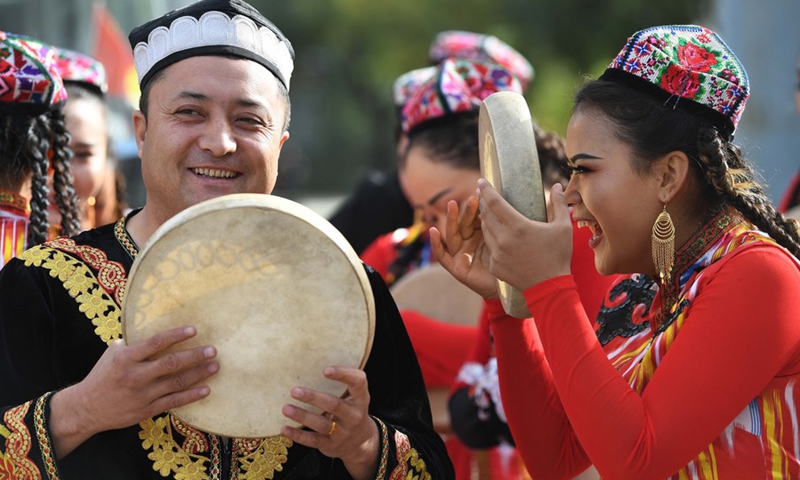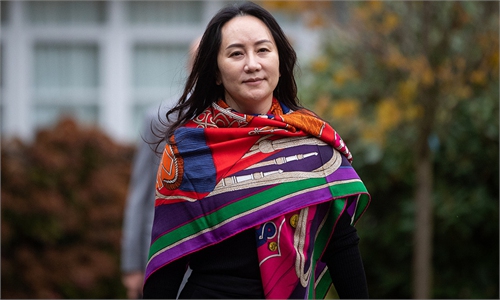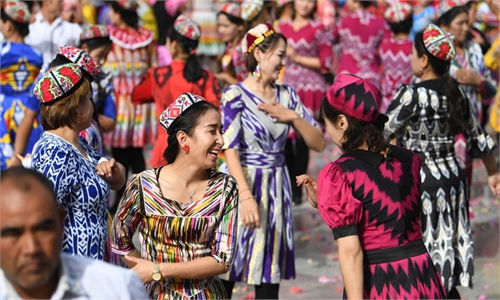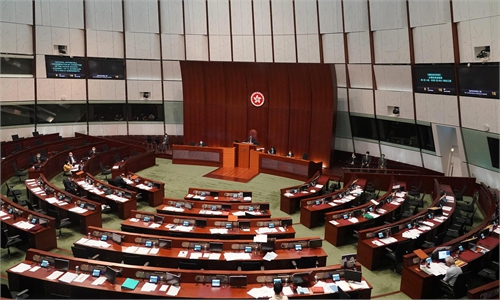
Artists prepare to perform during a culture and tourism festival themed on Dolan and Qiuci culture in Awat County of Aksu Prefecture, northwest China's Xinjiang Uygur Autonomous region, Oct. 25, 2019.(Photo: Xinhua)
The Canadian government has warned its citizens with ethnic ties to Northwest China's Xinjiang Uygur Autonomous Region that they could be "at risk of arbitrary detention" and should avoid visiting the region, a move that Chinese experts regarded as a new round of the China-smearing campaign from the US and its allies.
"Family members of Canadian citizens with Chinese citizenship have been detained." And people may be at risk of "arbitrary detention" if they have familial or ethnic ties to Xinjiang, according to travel advisories on the Canadian government website.
Zhao Lijian, spokesperson of the Chinese Foreign Ministry, said on Tuesday at a routine press conference that the content of Canada's travel advisories is "groundless."
China is a country under the rule of law and acts in strict accordance with the law. Any foreign citizen in China, as long as he abides by the law, has no need to worry, Zhao said.
In recent years, Xinjiang has been visited by record numbers of Chinese and foreign tourists, including more than 200 million in 2019. "We welcome more foreigners to Xinjiang and learn more about the real situation there. In the face of facts and truth, any lie and false information will be defeated," Zhao said.

Foreign diplomats visit the International Grand Bazaar in Urumqi, northwest China's Xinjiang Uygur Autonomous Region, March 30, 2021. From March 30 to April 2, a delegation comprising Vladimir Norov, secretary-general of the Shanghai Cooperation Organization (SCO), and more than 30 diplomats from some 21 countries visited Xinjiang.Photo:Xinhua
Updated on Sunday, the Canadian government travel advisories said that Xinjiang has put in place "invasive security measures" and authorities may "impose curfews and restrictions on short notice." Although the travel advisories admitted that "accurate information is hard to obtain," it still highlighted that "there are reports of extrajudicial internment and forced labor camps."
Li Haidong, a professor at the Institute of International Relations of the China Foreign Affairs University, told the Global Times on Tuesday that Canada portrays the prosperous and stable Xinjiang as a place of "arbitrary detention" to create an image of terror, and to pave the way for the intervention of the Five Eyes Alliance in Xinjiang-related affairs.
By hyping what has never existed in Xinjiang to sensationalizing stories, Canada misled the public, denigrated China's achievements and even legitimacy in Xinjiang governance, said Li. "This is a very insidious and malicious act."
As one of the most active countries to urge a boycott of the Beijing 2022 Winter Olympic Games, Canada's parliament passed a non-binding motion in February saying China's treatment of the Uygur Muslim minority in Xinjiang region constitutes "genocide." In March, Canada imposed sanctions on officials and one entity in Xinjiang, together with Five Eyes Alliance members like the US and UK.
Canada, a close US orbit which has assisted the White House in illegally arresting and detaining 5G giant Huawei's CFO Meng Wanzhou amid the China-US trade war in the Trump era, once again caught the Frisbee thrown by the Biden administration on Xinjiang-related affairs against China.
Ottawa's gesture this time, experts suggest, is the result of internal coordination between the US and its allies - an old-fashioned trick they used on Hong Kong affairs in 2020.
With the same intimidating phrase "risk of arbitrary detention," Canada, Australia, US and UK warned its citizens not to travel to Hong Kong and the Chinese mainland in updated official travel tips from July to September 2020.
The Canadian government has underestimated the judgment of the people in and out of Xinjiang, overestimated the destructive power of Western disinformation and smear, which would finally backfire, Li said.
China has no restrictions on foreign travel to Xinjiang, said Li Haidong, noting that only those who have done wrong may feel a "guilty conscience" to visit Xinjiang as described by Ottawa.




